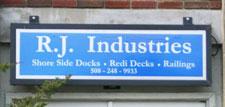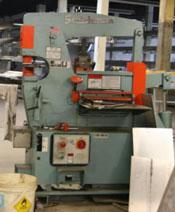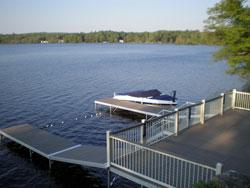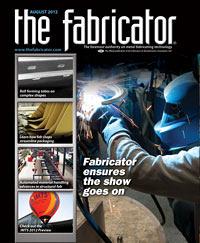- FMA
- The Fabricator
- FABTECH
- Canadian Metalworking
Categories
- Additive Manufacturing
- Aluminum Welding
- Arc Welding
- Assembly and Joining
- Automation and Robotics
- Bending and Forming
- Consumables
- Cutting and Weld Prep
- Electric Vehicles
- En Español
- Finishing
- Hydroforming
- Laser Cutting
- Laser Welding
- Machining
- Manufacturing Software
- Materials Handling
- Metals/Materials
- Oxyfuel Cutting
- Plasma Cutting
- Power Tools
- Punching and Other Holemaking
- Roll Forming
- Safety
- Sawing
- Shearing
- Shop Management
- Testing and Measuring
- Tube and Pipe Fabrication
- Tube and Pipe Production
- Waterjet Cutting
Industry Directory
Webcasts
Podcasts
FAB 40
Advertise
Subscribe
Account Login
Search
Piecing together a growing business
Ironworker at RJ Industries keeps modular aluminum components flowing
- By Sue Roberts
- August 3, 2012
- Article
- Punching and Other Holemaking

Docks, decks, and ramps for commercial and residential customers are built from modular components produced at the RJ Industries shop in Charlton, Mass.
Ironworkers, long dubbed the industry workhorses, fabricate heavy, thick iron. They punch, cut, and bend material to create the odd components that don’t fit in the usual production flow. Their strength is producing one-offs, right?
Not at RJ Industries in Charlton, Mass. The ironworker in that shop is punching and cutting at the center of production, surrounded by a variety of saws, a bender and notcher, a roller, and a 10-ton brake. As for materials, the parts coming off the ironworker are 100 percent 6061T structural-grade aluminum. Gauges are from 0.125 to 0.500 in.
Commercial enterprises and residential customers use products comprising parts made on this workhorse to “improve the view,” said Ray Johnson, owner and operator.
That view may encompass classic or floating lakeside docks, ADA-compliant access ramps, decks and stylish railings that protect against missteps and inhibit wanderings, or a custom design that combines several of these structural products.
RJ Evolution
Johnson started the business as a one-man shop in 1996 producing commercial and residential dock systems. Shore Side Docks, one of the three businesses that make up RJ industries today, provides modular components that bolt together to create dock frames, decking systems, watercraft lifts, and boat dock accessories. The majority of these components, including some 25 feet long, have bends and holes produced on the ironworker.
The same variety of components provides the basis for standard and custom docks. Johnson deviates from the basic plans to turn customers’ own designs into attractive, functional structures. On the dry side, boat aficionados see versions of the custom systems used to display watercraft in showrooms and at expositions.
RD Railings & Decks became RJ Industries’ second company in 2003. Eight years later Freedom Ramp joined the roster. Both entities build modular access systems for the handicap market. Freedom Ramp addresses the basic needs of accessibility with ramps that do not attach to structures. RD Railings & Decks’ lineup is more expansive, also offering decks with design options such as picket railings and stairs.
Three From One
Standard components and the modular approach all three companies take give Johnson design flexibility coupled with the advantage of quick assembly and installation. This approach requires a lot of parts with varying geometries that need to be produced to exact specifications for a proper fit. Johnson’s ironworker has been meeting that need for nearly 10 years. It continues punching and cutting aluminum to produce about 30 standard parts.
Many components contribute to the products of all three companies. For example, Johnson said, “The frame concept runs through the docks, decks, and ramps, and the leg assemblies share several components.”
Johnson’s shop operates on a JIT basis to minimize inventory. That operational strategy, added to the need for custom parts, keeps the ironworker pumping aluminum. During the busy season that workhorse puts in a full 40 hours a week.

After nearly 10 years of service, the ironworker continues to create features in aluminum parts with tooling designed by RJ Industries to minimize burring on the bottom of the punch.
Faster, Better Parts
As with any shop, RJ Industries encountered production challenges when fine-tuning production flow. The ironworker challenges came in two forms. The first was how to produce close-tolerance connecting brackets efficiently. The second was how to punch large aluminum pieces without deformation.
Bends and bolt holes in the connecting brackets need to line up properly with other components. With the variety of standard configurations, measuring for the placement of each hole and cutting each part was a slow, tedious process. Johnson addressed that issue, maintained tolerances, and upped production by adding a measuring system available from Scotchman, the ironworker’s manufacturer. A series of punching and cutting stops allow material to be fed into each station without pausing to measure before each operation. Johnson estimated that the addition of this option reduced production time by 20 percent.
A different approach was used to find a fix for punching large aluminum pieces without the deformation that can occur in softer material. RJ Industries designed its own ironworker tooling, ran it through heat-treat, and now uses the 40-ton punching capacity to produce perfectly fitting aluminum pieces.
“We designed the punch and dies to tighter tolerances than normal, giving us less burring on the bottom of the punch. This saves time cleaning up the part for production,” Johnson said. “Everyone told me the tooling wouldn’t do the job, but since I deal in 100 percent aluminum, it works.”
Ramping up Sales
In the last 16 years RJ Industries has expanded from a one-man shop producing dock components to a five-man operation. Today the three companies under the RJ Industries umbrella produce highly visible, functional product lines that are marketed through a sales network of 30 dock dealers, 20 building contractors, and three ADA ramp dealers scattered throughout New York and New England.
Seasonality comes into play with Shore Side Docks because sales are concentrated in the northeast states. “But the introduction of the ADA ramps and railings should soften the seasonal trends,” Johnson said. He expects sales of ramps and railings to be the fastest-growing segment of his business in the next two to three years.
Staying true to his entrepreneurial calling, Johnson keeps company offerings flexible with what he calls the “I need something a little different department.” There are times, however, when that department is closed. “If someone asks for custom work during our busy season [warm weather when people head outdoors], I have to tell them to come back later in the fall when we have more time.”
About the Author

Related Companies
subscribe now

The Fabricator is North America's leading magazine for the metal forming and fabricating industry. The magazine delivers the news, technical articles, and case histories that enable fabricators to do their jobs more efficiently. The Fabricator has served the industry since 1970.
start your free subscription- Stay connected from anywhere

Easily access valuable industry resources now with full access to the digital edition of The Fabricator.

Easily access valuable industry resources now with full access to the digital edition of The Welder.

Easily access valuable industry resources now with full access to the digital edition of The Tube and Pipe Journal.
- Podcasting
- Podcast:
- The Fabricator Podcast
- Published:
- 04/16/2024
- Running Time:
- 63:29
In this episode of The Fabricator Podcast, Caleb Chamberlain, co-founder and CEO of OSH Cut, discusses his company’s...
- Industry Events
16th Annual Safety Conference
- April 30 - May 1, 2024
- Elgin,
Pipe and Tube Conference
- May 21 - 22, 2024
- Omaha, NE
World-Class Roll Forming Workshop
- June 5 - 6, 2024
- Louisville, KY
Advanced Laser Application Workshop
- June 25 - 27, 2024
- Novi, MI
































